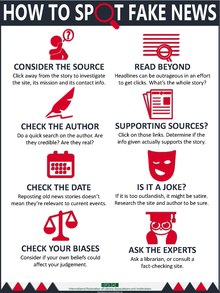User:Yixuan Li97/sandbox
 | This is a user sandbox of Yixuan Li97. You can use it for testing or practicing edits. This is not the sandbox where you should draft your assigned article for a dashboard.wikiedu.org course. To find the right sandbox for your assignment, visit your Dashboard course page and follow the Sandbox Draft link for your assigned article in the My Articles section. |
Introduction
Fake news is the spread of false information through various platforms. Fake news originates from several unauthentic websites. Some websites are even established with the intention of publishing misleading articles. The perpetrators of fake news usually name these sites to resemble those of legitimate news outlets, for instance, the denverguardian.com, which resembles the Guardian[1]. The information is sometimes published in a way that people may interpret it as factual if taken out of context, while at times, a mix of truthful news and false information is published. In the wake of the COVID-19 pandemic, more people have turned to social media in search of information and updates. Individuals take advantage of such a situation, to publish a series of false truths and disinformation.
Fake News in India
Fake news in India is not a new phenomenon. The rumor mills, for instance, in 1995 the “news” about Lorde Ganesha’s idols churned out. It was claimed that these idols are drinking milk[2]. Social media platforms such as Twitter, Facebook, and WhatsApp are being used to share fake news stories in India. It is worth noting that the majority of social media users in India constitute people living in urban centers and have a general knowledge of media literacy. As a matter of fact, the propagators of these fake stories are well-educated. Fake news in India, coupled with the literacy rate, has made it difficult to implement a true spirit of democratic decision making. The majority of Indians obtain information from social media platforms, where information is rarely checked for validity and authenticity. The advent of the internet has made it easy to spread information, including fake news. The advancement in technology is giving people an opportunity to produce content and share it, which can barely be unnoticed by the mainstream news media houses as they compete for readership and viewership[3]. WhatsApp is the leading platform through which the fake news is being spread in India. The app is majorly used by Indians to connect with friends and family. However, certain websites have been established to bust fake news. For example, Altnews.in, Check4spam.com, Boomlive, and SM Hoax-Slayer are some of the prominent websites used to debunk fake news.
Fighting Fake News in India

The spread of false information has implications on a country’s democracy, economy, and national security. Nobody is safe from the damage caused by falsity. This calls for a concerted effort and to understand how it is spread and come up with strategies to counteract[4]. In India, for instance, certain websites have been established to bust fake news. Altnews.in, Check4spam.com, Boomlive, and SM Hoax-Slayer are some of the prominent websites used to debunk fake news.
As COVID-19 spread across the world, misleading information has been spreading too. With the number of cases and deaths rising in India, rumors and false information about the virus from conspiracy theories to nationalists’ theories have been spreading, with social media platforms being the catalyst. To counteract this, over 400 scientists have concerted their efforts to debunk false information about the virus[5]. In addition to substantiating and communicating the information, the team also analyze all the available data and offer their support to both national and local governments for evidence-based action.
Yixuan Li97 (talk) 16:40, 3 May 2020 (UTC)
- ^ Hunt, Allcott; Matthew, Gentzkow (2017). "Social Media and Fake News in the 2016 Election". Journal of Economic Perspectives. 31: 217. doi:10.1257/jep.31.2.211. Retrieved 2 May 2020.
- ^ Harikrishnan, Bhaskaran; Harsh, Mishra; Pradeep, Nair. "Contextualizing Fake News in Post-truth Era: Journalism Education in India". Asia Pacific Media Educator. Retrieved 2 May 2020.
- ^ Farooq, Gowhar (2018). "Politics of Fake News: How WhatsApp Became a Potent Propaganda Tool in India". Gowhar. 9 (1). Retrieved 2 May 2020.
- ^ "Truth, Disrupted". Harvard Business Review. 2018-07-17. ISSN 0017-8012. Retrieved 2020-05-08.
- ^ "How 300 Indian scientists are fighting fake news about COVID-19". World Economic Forum. Retrieved 2020-05-08.
